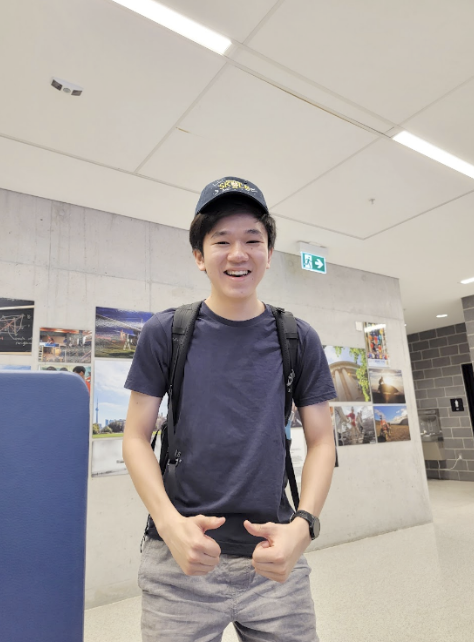
My name is Ian Wu, and I’m from Markham, Ontario. I like running because it gets my mind off stuff.
Why did you choose U of T EngSci?
I was interested in the foundation years where I got to explore everything before specializing in the BME (Biomedical Systems Engineering) major.
How did you find the transition from high school to university?
In terms of academics, I did the AP program for core science, math, and English. It was hard transitioning to EngSci. Because of online school, I hadn’t written an in-person exam for three years. Academics is really different, because in high school, the goal is to know everything, but in EngSci, you have to accept not knowing everything when going into tests. Your grades will drop numerically, but you learn a lot more, because the EngSci curriculum is unique and you see connections between courses. You see linear algebra in programming courses, and you use MATLAB in CIV (civil engineering) courses.
In terms of my living situation, I used to live at home with my parents, which was easy. In first year, I rented with my brother, who is also in EngSci. It is a big adjustment living away from parents, because nobody is telling you to do the dishes, to eat, or to go outside. It is empowering, but you must be responsible for yourself. One nice thing was that I lived in the GTA (Greater Toronto Area), so I could go home whenever I wanted to. However, I didn’t do this much because I was busy.
In terms of social life, I was used to small classes of around 30, so I sort of knew everyone. EngSci is a close-knit community, but you won’t know everyone in the program. You could choose to be the person sitting at the back, but you can also get involved and meet a lot of people.
Transitioning from high school, looking at past exams and learning test taking skills can help you get high marks. Midterms add up to a high percentage of your final mark, so you should invest in them. If you are comfortable in the exam room, that really helps with your marks. Try to understand everything as you go. This isn’t always possible, but if you don’t, try to clear up things as soon as possible, that inhibits you from learning concepts later in the course. You also can’t ask professors if you’re cramming at the very last moment. Use online forums, because people ask great questions there, and you can also answer them to test your knowledge.
I made most of my friends from F!rosh. Everyone is a new environment and you get to meet cool people. Outside of that, you can connect with people you sit with in lectures, join extracurriculars, or simply reach out to people.
Are there any extracurricular activities you were part of and what did you do?
I am part of the Human Powered Vehicles Design Team (HPVDT). It is good for first-years because they do a breadth of projects. Currently they are focused on developing human-powered aircraft. They accept everyone without a rigorous application process and you can commit as much as you want. I learned a lot of technical skills, such as building and using SolidWorks. You don’t learn everything in school; you apply and learn different skills outside of that. However, I would caution people against overcommitting. First-year EngSci is a big change, and you shouldn’t feel like missing out because you’re not joining as many clubs as you should. Some do a lot, some do none, and it’s about finding what’s a good balance for you. Outside of Engineering, I also enjoy running.
Favourite course – what made them stand out to you? What was the most challenging course?
My favourite course is CIV102. It was the most challenging course, and it took the most time. However, seeing the professors and teaching team put in their effort, it also motivates me, and it feel great to be in an environment where they want me to succeed. Even though I won’t go into civil engineering, I like how it’s all focused on applications – look at the buildings around you – and there are weekly problem sets and quizzes which are helpful to make sure you are always on track.
Another of my favourite courses is MAT185. They give you trivial questions computationally, which is good because I am bad at mental math. It is a proof-based course, and when you have an answer you know is right, it is fun to be able to show why, and have it be indisputable. Linear algebra also has lots of applications, which we went over in the course.
What is one piece of advice you want to tell incoming first years?
Sleep more! It makes everything better for you, not just in school, but it makes waking up and talking to people nice. Now, I don’t care if I got a slightly lower mark in a CIV quiz because I slept for an extra hour! Don’t get too caught up in the moment. You don’t need to go all out in first year. If you feel caught up, give yourself a break before things get worse. EngSci will be really fun, and maybe you’ll see me in the Common Room!
